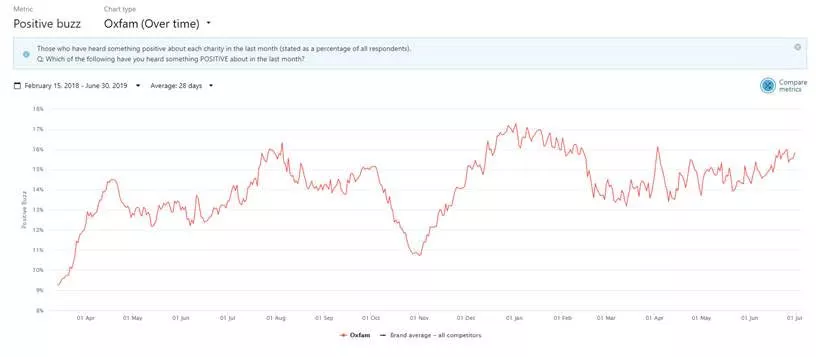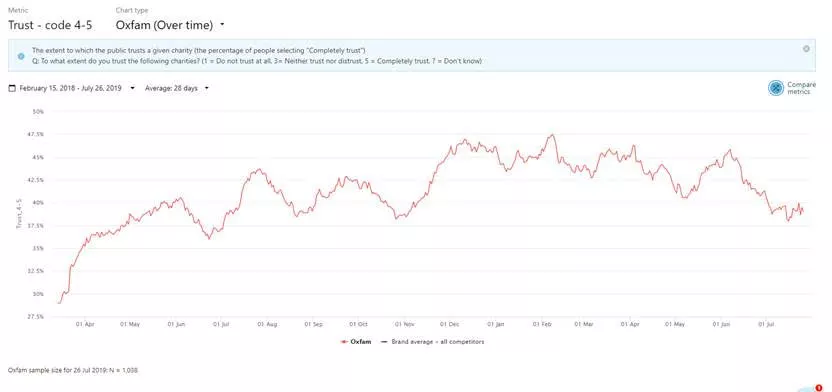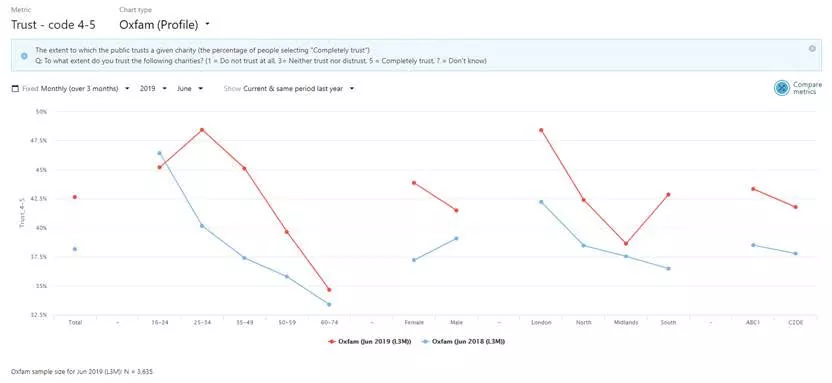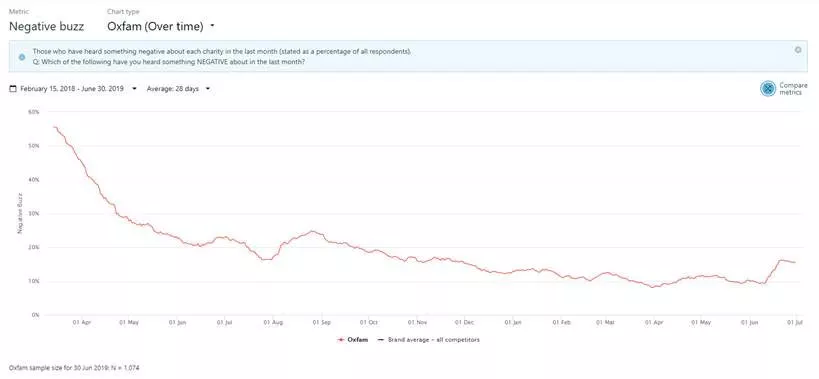Oxfam: doing well in reputation rehab
Over the last 18 months, Oxfam has faced a crisis of its own making. After decades of being a rescuer, Oxfam became the perpetrator and has, rightly, faced public outrage.
The scandal represented everything Oxfam stands against. In response, up and down the country direct debits, donations and casual commitments were deferred, redirected or cancelled.
As Nicola Tallett, director of fundraising for Oxfam, commented:
“In March (2018), we wrongly assumed that everyone who was going to react had already reacted and we would go back to that normal attrition rate. But, even across April and May we were getting higher attrition rates than we would normally expect, by the time we got to June we’re about now on par with it. We’ve already surpassed an annual amount of attrition in the first six or seven months of the year. That’s how impactful it was on us.”
One of the main recommendations in the Charity Commission’s recent report was for Oxfam to set about rebuilding its reputation with the public. After all, the brand’s reputation is instrumental in the generation and distribution of charitable aid to those who need it most.

Positive buzz about Oxfam – chart source: BrandVue
Interestingly, our research shows that Oxfam began rebuilding trust with the public quicker than may have been expected. In fact, after falling sharply after the scandal first broke, BrandVue Charity data (which tracks daily public sentiment towards over 100 UK non-profit brands) shows the public’s trust in Oxfam began increasing within just weeks of February 2018 when Deputy Chief Executive Penny Lawrence resigned in “shame” over the emerging scandal.

Trust in Oxfam GB from February 2018 to July 2019 – source: BrandVue
Contrary to media sentiment, the general public’s trust in Oxfam, measured by the % of the adult population who say they “trust” Oxfam, has risen steadily from 1 in 8 in March 2018 to 1 in 4 by the end of June 2019. As a benchmark, Cancer Research, the UK’s most valuable charity brand, enjoys a constant 1 in 2 throughout the period. Oxfam is recovering fast and, at this rate, in 12 months’ time it may be back up there with the best.
We can dig into the recovery by looking at which groups have increased their trust level between second half of 2018 and first half 2019. Using BrandVue data we can see overall trust levels have increased most dramatically amongst 35 – 49 year olds, women, those in London and the Midlands the more affluent groups of ABC1 individuals.

Issues of trust persist with later life adults aged 60+ and millennials and those in the South, outside of London. Nevertheless, the pattern shows positive momentum began before the Commission reached its opinion that Oxfam needed to recover trust.
More broadly, our data suggests that in the age of the internet, the general public makes up its own mind, it doesn’t wait for institutions to tell it how or what to think. People have sifted through the allegations, the facts and rhetoric and began to make up their own mind.
Big businesses and events, too, play their part. At this year’s Glastonbury, the Oxfam logo was once again pinned to the Pyramid stage, alongside other UK stalwart, Greenpeace. If Glastonbury’s organisers felt comfortable to, first, align the world’s largest music festival with Oxfam and, more tangibly, channel revenue from every ticket sold to the charity, the public may then feel comfortable to follow suit.
And as far as we can see, no one complained. In fact, many of this year’s pop stars, including Kylie, Billie Eilish, Jonny Marr and Sheryl Crow donated the on-stage outfits to Oxfam in support of their second-hand clothing appeal.

Negative buzz for Oxfam from February 2018 to June 2019 – source: BrandVue Charity
BrandVue data shows buying and donating clothing via Oxfam’s retail network is still this most popular way for Brits to support Oxfam. Reinforcing this behaviour is the right strategy and plays to Oxfam’s most reliable qualities as a non-profit retailer.
Last year, BrandVue Charity showed that Oxfam’s brand value was depressed due to negative brand perceptions. Despite this, the brand was revealed as the UK’s 7th most valuable charitable brand. We look forward to the recovery of its brand value, not only because it will mark the recovery of the organisation, but because it will mark the organisation’s successful return to its core mission.
In many ways, the verdict from the Charity Commission doesn’t mark the beginning of a difficult rebuild, but its closing phases.
Julian Dailly is Senior Vice President at Savanta, the intelligence business which helps people make better decisions. He heads up BrandVue Charities, the daily tracking survey of the UK’s top 120 not-for-profit and charity brands, and formerly worked at Royal Society for Blind Children and Interbrand.
Advertisement



